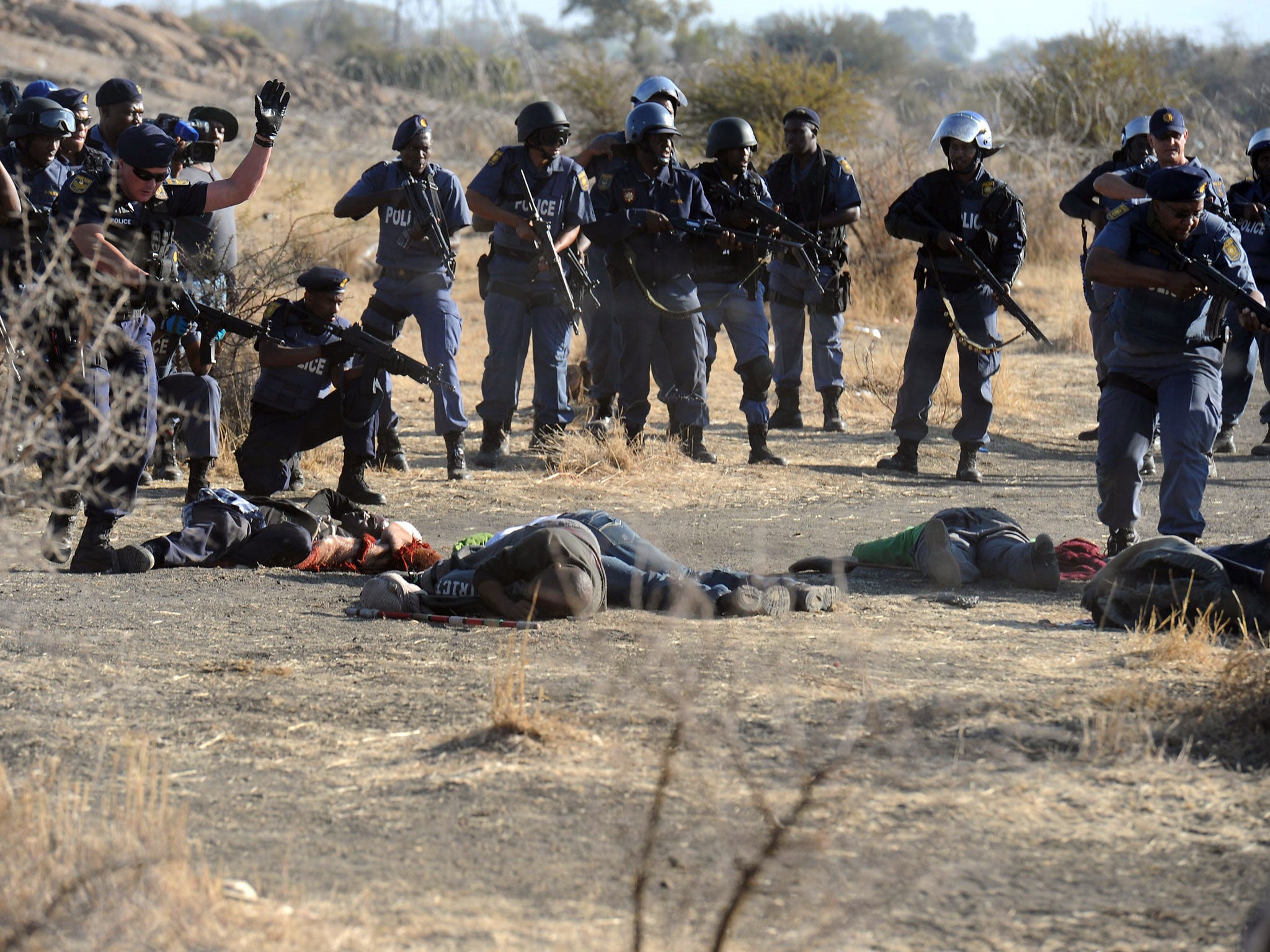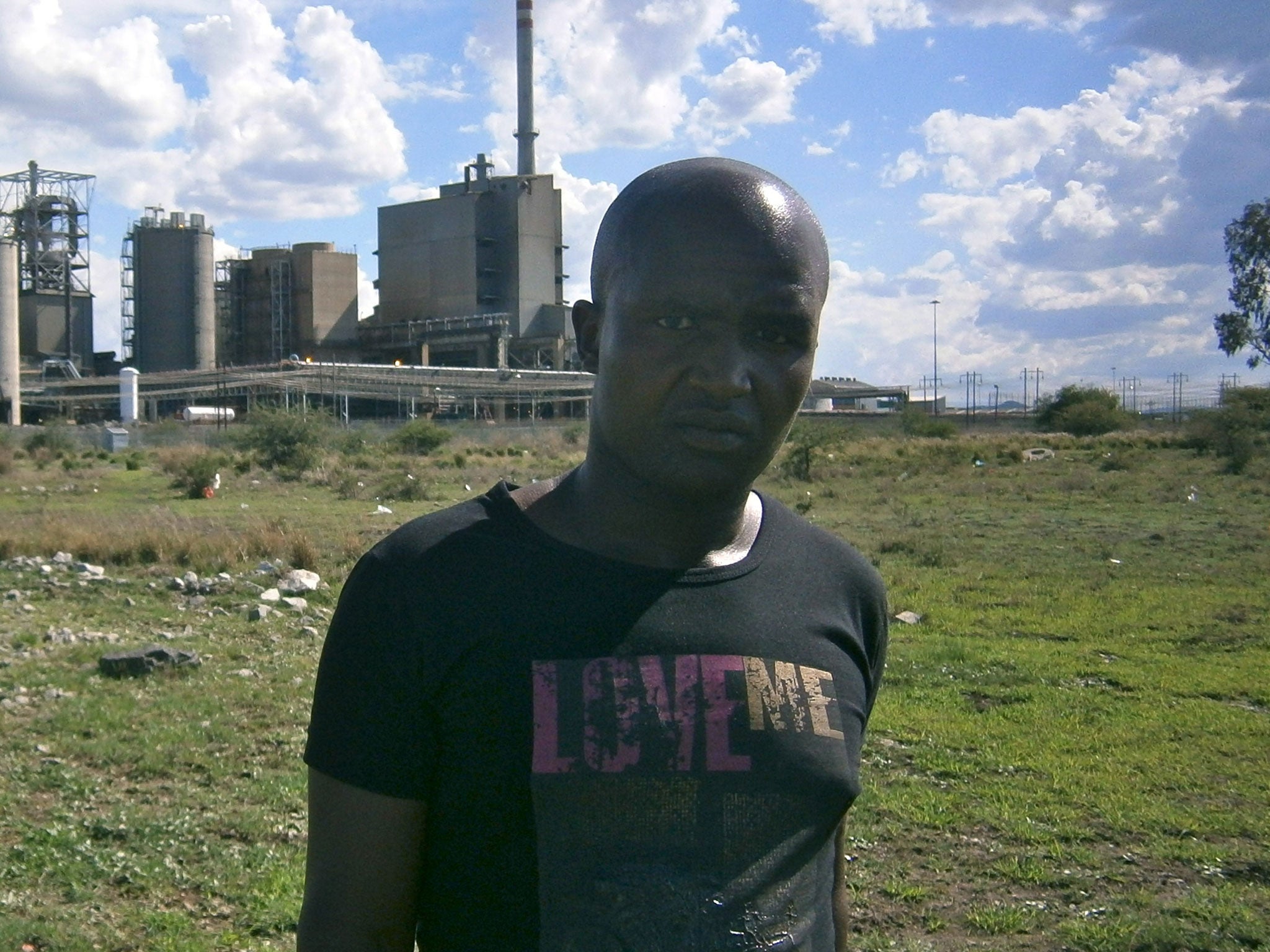Marikana mine strikes: No peace and reconciliation 18 months after South African police shot and killed 34 protesters
Last year South African police fired on workers protesting about wages and conditions at a platinum mine. There is a fear that they will never be held to account for the killings

“This is where the police were standing,” says Xonlani Nzuza, pointing into the hazy scrub as the car bounces and jumps. “This is where my two friends died. That’s where I hid. In the rock.”
It has been almost 18 months since the 29-year-old narrowly escaped with his life when police opened fire on protesting workers at a platinum mine north of Johannesburg, killing 34 and injuring dozens. Today, he finds it painful to recall the scenes he witnessed that day, and painful too to reflect that the miners’ fight for justice is still unfinished.
Mr Nzuza was one of the leaders of the striking miners and was front and centre when armed police decided to break up the protests. In recent weeks, he has been giving evidence to a commission of inquiry that is investigating what happened.
So far, the miners believe the commission has shown no indication that it will go after the police chiefs or officials who ordered the crackdown. At the same time, the commission has said it does not think it is being told the truth. Testimony delivered by the South African Police Service (SAPS) is in “material respects not the truth”, it said in a statement earlier this year.
The investigation into the shooting of 34 miners on 16 August 2012 and 10 others in the subsequent days is being seen as a test case for South Africa. Many have accused the ruling African National Congress (ANC) government of being too close to the mine owners and of failing to protect the rights of workers.
Like many of the others working deep underground in the mines at Marikana, Mr Nzuza was born and grew up in Eastern Cape province. In 2006, a lack of opportunities pushed him towards the rich seams of Marikana, where his father was already working.
Mr Nzuza explained the details of a working day supposedly of eight or nine hours but which, in reality, is considerably longer. The miners on his shift wake at 3am to catch a bus to the pithead and then wait again for a cage to take them down into the mine. The hours for which they are paid start only when he reaches his machine deep underground. By the time they repeat the process again at the end of the shift, it can be 4pm before he reaches the metal-roofed room he rents. Before the strike, he earned the equivalent of £235 a month; now he receives £293.
“The strike was for better wages. There was a belief that the money we were paid should match the hard work we did. It was also for better working conditions,” said Mr Nzuza. “Maybe the improvements will come in future. Right now, the money increased but everything else has stayed the same.”
Thousands and thousands of families from across South Africa and beyond its borders are drawn to Marikana. They live in wretched conditions in camps set out in the shadow of the mines. When it rains, the rutted, unpaved tracks turn to mud.

Primose Sonti, an activist who lived in the Wanderkop settlement, recently set up a group to help women in the community. She says she has watched the struggle of the families of those who were killed. Most of the relatives have returned to their homes in the Eastern Cape. More workers show up at Wanderkop every day. “I don’t think they will get any compensation,” Ms Sonti said of the families.
Since the shooting, more evidence has emerged to suggest that police were preparing for a showdown with miners at the site, owned by the London-listed South African firm Lonmin. Senior officers ordered extra ammunition and the dispatch of mortuary vans in advance. The inquiry has heard that police fired at least 600 live rounds to disperse up to 3,000 striking miners, some of whom were armed with machetes and traditional weapons.
What has raised the stakes at the hearings has been details of transcripts of conversations between a senior police official, Lieutenant General Zukiswa Mbombo, and an executive of the Lonmin company a day before the shooting. During the conversation, the police commander said she had been told by the police minister that Cyril Ramaphosa, a senior figure in the ANC and a Lonmin shareholder, was exerting pressure. “Going forward, our actions will be determined by the work you do because we do not want to be running off,” said the Lonmin executive.
Activists say it is clear the police were preparing for a day of violent encounters. And they fear the government will be under pressure to try to keep a lid on things. “Given the fact that the police were on the back foot, it looks very much clear that this was premeditated and they were expecting miners’ lives to be lost,” said Rehad Desai, a filmmaker and activist.
The events at Marikana have considerable political implications, and central to this is a struggle between various unions for members and influence. In recent months, the National Union of Mineworkers (NUM) has reportedly lost thousands of members of the more radical Association of Mineworkers and Construction Union (Amcu). The NUM is no longer the largest member of South Africa’s federation of trade unions.
Julius Malema, a former ANC youth leader who is considered hard-line, has made a point of visiting Marikana and appealing to the workers. Having been ousted from the ANC, he held a rally for his new party, the Economic Freedom Fighters, among the miners in October.
“This is your land. You do not have to pay for the land. It has been already paid by the sweat of your fathers,” he said, arguing that white South Africans were refusing to hand over land he claimed they had stolen. “Till today they are not ashamed of the killing of our people. They want us to kneel before them. We are not going to do that.”
In the days since the death of Nelson Mandela, the man who devoted his later years to trying to unite South Africa’s different communities and ending ethnic divisions, many have raised concerns that the country could lurch backwards. Among the miners at Marikana, there is a fear that Mandela’s presence, even in his frailty, somehow acted as a guarantee of the few rights they do have. “His death represents a step back in our [campaign for] human rights,” said Mr Nzuza, who survived the massacre. “The constitution will be overwritten by the powerful.”
Join our commenting forum
Join thought-provoking conversations, follow other Independent readers and see their replies
0Comments